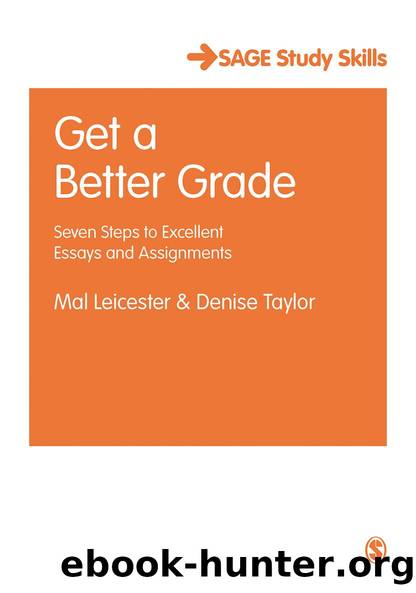Get a Better Grade by Mal Leicester Denise Taylor

Author:Mal Leicester, Denise Taylor [Mal Leicester, Denise Taylor]
Language: eng
Format: epub
Tags: Social Science, Essays, Literary Collections
ISBN: 9781526415790
Google: DmwuDwAAQBAJ
Barnesnoble:
Goodreads: 34547606
Publisher: SAGE
Published: 2017-07-31T00:00:00+00:00
One: Conceptual Analysis
Please note that it is customary in academic work to use quotation marks to show that we are talking about a concept. These quotation marks are not used if we have already used the word concept in the sentence. For example:
We will now explore the concept of education.
We will now explore âeducationâ.
Concepts are ideas, not in the sense of mental images or pictures, but in the sense of the mental categories by which we make sense of our experiences of the world. We have concepts of concrete objects, which we can sense [touch and see and hear and smell], such as table, chair, sea, sky, smoke, etc. You can sense the concrete object e.g. a chair, but not the concept of the object, e.g. âchairâ. Our concept of âchairâ is our idea of an object-which-is-for-sitting-on. You cannot sit on the concept itself.
We also have abstract concepts which are not of concrete objects but are abstract ideas such as truth, love, history and education. (You can see the thing, education, going on in classrooms, but you cannot see the concept of education, which is our idea, our mental category, of the kinds of activity which we would count as educational. (e.g. involve worthwhile learning, etc.).
It is abstract concepts which we tend to analyse in our essays in order to become clearer about what they mean â what key distinctions they draw and what characteristics they delineate. It is the abstract concepts which figure in essay questions and which therefore may require some explanation if the essay is to be clear and meaningful to the reader. Think of concepts like education, lifelong learning, professional development, occupational therapy, racism, social psychology, criminality, the subconscious, social class, mental illness, quality, creativity and critical thinking.
When we think about the meaning of an abstract word we are thinking about the concept rather than about the thing itself. To analyse this meaning is to explore the use of the term in a variety of contexts, seeking to understand the distinctions it makes and its defining characteristics. By thus thinking about a complex, abstract term (an idea or concept) we take a meta-level (overview) of its uses and of the necessary and sufficient conditions or criteria for its use, and of what it includes and excludes. Therefore, when in the previous chapter we analysed the concept of critical thinking, we set out its central feature (searching reflection); its main characteristics (identifying and challenging assumptions, etc.); and its overlaps and differences with other forms of thinking, e.g. creative thinking and differentiated thinking which is not critical (e.g. superstitious, prejudiced, etc.).
Many essays benefit from some degree of clarification of the key term or terms central to it. For some essays it will be sufficient to write:
Download
This site does not store any files on its server. We only index and link to content provided by other sites. Please contact the content providers to delete copyright contents if any and email us, we'll remove relevant links or contents immediately.
| Publishing & Books | Research |
| Writing |
Asking the Right Questions: A Guide to Critical Thinking by M. Neil Browne & Stuart M. Keeley(5775)
Autoboyography by Christina Lauren(5235)
Eat That Frog! by Brian Tracy(4540)
Dialogue by Robert McKee(4404)
Sticky Fingers by Joe Hagan(4198)
Journeys Out of the Body by Robert Monroe(3624)
Annapurna by Maurice Herzog(3467)
Full Circle by Michael Palin(3449)
Schaum's Quick Guide to Writing Great Short Stories by Margaret Lucke(3381)
Elements of Style 2017 by Richard De A'Morelli(3349)
The Art of Dramatic Writing: Its Basis in the Creative Interpretation of Human Motives by Egri Lajos(3067)
Atlas Obscura by Joshua Foer(2962)
Why I Write by George Orwell(2953)
The Fight by Norman Mailer(2940)
The Diviners by Libba Bray(2937)
In Patagonia by Bruce Chatwin(2930)
The Mental Game of Writing: How to Overcome Obstacles, Stay Creative and Productive, and Free Your Mind for Success by James Scott Bell(2908)
Venice by Jan Morris(2573)
The Elements of Style by William Strunk and E. B. White(2473)
